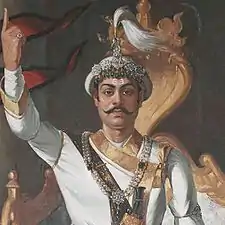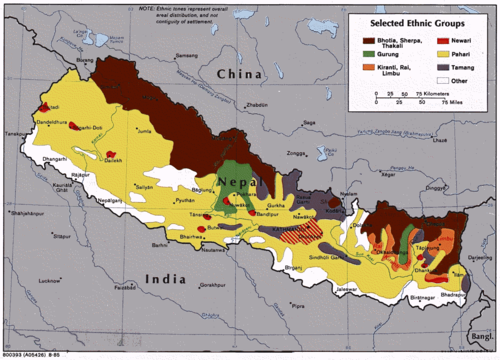Nepalis
Nepalis (English: Nepalese ; Nepali: नेपाली गण) are the Indo-Aryan and Sino-Tibetan citizens of Nepal under the provisions of Nepali nationality law. The country is home to people of many different national origins. As a result, people of Nepal do not equate their nationality with ethnicity and language, but with citizenship and allegiance. Although citizens make up the majority of Nepalese, non-citizen residents, dual citizen, and expatriates may also claim a Nepalese identity. Nepalese can also be descendants of migrants from Tibet, as well as parts of Myanmar and Yunnan, and may further trace their origin to Central Asia, along with indigenous peoples.


Nepal is a multicultural and multi-ethnic country. Kathmandu Valley, in the middle hill region, constitutes a small fraction of the nation's area but is the most densely populated, with almost 5 percent of the nation's population.[1][2]
The population ranking of 125 Nepali castes/ethnic groups as per the 2011 Nepal census.[3]
| Rank | Caste/ethnic groups | Population | Percentage composition |
|---|---|---|---|
| 1 | Chhetri | 4,398,053 | 16.60% |
| 2 | Hill Brahman/Bahun | 3,226,903 | 12.18% |
| 3 | Magar | 1,887,733 | 7.12% |
| 4 | Tharu | 1,737,470 | 6.56% |
| 5 | Tamang | 1,539,830 | 5.81% |
| 6 | Newar | 1,321,933 | 4.99% |
| 7 | Kami | 1,258,554 | 4.75% |
| 8 | Nepali Muslims | 1,164,255 | 4.39% |
| 9 | Yadav | 1,054,458 | 3.98% |
| 10 | Rai | 620,004 | 2.34% |
| 11 | Gurung | 522,641 | 1.97% |
| 12 | Sherpa | 472,862 | 1.78% |
| 13 | Thakuri | 425,623 | 1.61% |
| 14 | Limbu | 387,300 | 1.46% |
| 15 | Sarki | 374,816 | 1.41% |
| 16 | Teli | 369,688 | 1.40% |
| 17 | Chamar/Harijan/Ram | 335,893 | 1.27% |
| 18 | Koiri/Kushwaha | 306,393 | 1.16% |
| 19 | Musahar | 234,490 | 0.89% |
| 20 | Kurmi | 231,129 | 0.87% |
| 21 | Sanyasi/Dasnami | 227,822 | 0.86% |
| 22 | Dhanuk | 219,808 | 0.83% |
| 23 | Dusadh/Pasawan/Pasi | 208,910 | 0.79% |
| 24 | Raute | 618 | 0.00% |
| 25 | Nurang | 278 | 0.00% |
| 26 | Kusunda | 273 | 0.00% |
| 27 | Hyolmo / Yolmo | 1,50,000 | 1% |
| Others | 132321 | 0.7% | |
| - | Total | 26,494,504 | 100.00% |
Native Nepali speakers
There are around 16 million native speakers of the Nepali language, which includes around 12 million in Nepal, three million in India, and about a million more including populations in Bhutan and other countries in the region, as well as the Nepalese diaspora around the world.
Others
Other people who are neither citizens or nationals of Nepal nor native speakers of the Nepali language, may still be referred to as Nepalis, based on their connection with the country or the Nepali language. People belonging to ethnic groups found in Nepal and using Nepali as the lingua franca, and other descendants of the people of Nepal or speakers of the Nepali language are also referred to as Nepalis.
References
- "Decadal Growth :www.cbs.gov.np" (PDF). Archived from the original (PDF) on 31 July 2013.
- "Nepalese peoples and nationality law". The World Factbook. CIA.
- "Nepal Census 2011" (PDF).